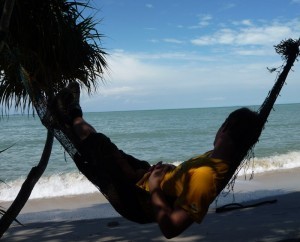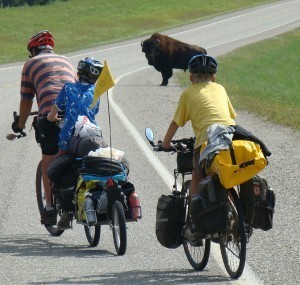Rolf Potts's Blog, page 104
March 9, 2012
Pre-trip planning, post #3: gear
Vagablogging :: Rolf Potts Vagabonding Blog
This post is the third in a series on pre-trip planning (see the Intro, post #1: research, and post #2: travel insurance).
Ahh. Gear. The expense I always fail to calculate into my trip budget. Each of us packs differently, and each of us has different "must-have" items that we take on the road. Here is my own personal must-pack list.
Daypack: My latest obsession is to pack earplugs and a blindfold (or a Buff headband)— these two things can make even the loudest airport departure lounge feel like a private hotel room. A small headlamp always seems to come in handy. Also in the daypack: headphones, a few pens (the ones at the visa counter never seem to work), iPod, a camera and charger, a book or reading material, alarm clock (or iPhone), a small packet of Advil, and sleeping pills if I'm going on a long overnight journey. My favorite daypack has a special pouch for a Camelback water bladder, which is essential if I'm going hiking. My sunglasses are usually on my head or in my daypack.
Main pack: I'm religious about packing DEET-based mosquito spray, otherwise the mosquitoes feast on me. The good chemical stuff isn't always available abroad and the herbal repellants do not do the trick for me. I always pack a sarong, which does triple duty as a light towel/beach blanket/bedsheet. Also in the main pack: an electric converter or adapter, a Swiss army knife, and water sterilization pills if I'm going hiking or traveling to a country where I can't drink the tap water.
For toiletries, I'm a huge fan of the non-breakable Nalgene bottles—nothing worse than having your shampoo bottle leak on all your stuff. I also love these kinds of toothbrush covers. Duct tape, string, washing powder, and extra ziplock bags always come in handy. Wet wipes/hand sanitizer are useful for trips where you won't see a shower for a while.
The latest buzz has been about the Steripen (I've heard great things, but haven't tried it) and I'm loving my NEOS overshoes (pictured at right), which are a cross between a gaiter and a boot.
Original article can be found here: Pre-trip planning, post #3: gear
Where are you happiest?
Vagablogging :: Rolf Potts Vagabonding Blog

Girl holding a "Free Hugs!" sign. Photo: Jesslee Cuizon / Flickr
Is happiness a state of mind or a state of place? The answer may be is that it's not so clear-cut, and one can lead to the other. An article titled How to be happy anywhere sparked this train of thought.
To be fair, a lot can depend on luck. You may be struck by serendipity, and have one great experience after another in one place. Like when you meet a great person, and end up exploring a locale together. A new friend can make an average journey into something unforgettable. Long after you've forgotten how much the place ticket cost, you'll still think fondly of the cool people you met along the way.
On the flip side, you could encounter endless problems during a trip and associate it forever with bad memories. For example, I had a friend who faced a marathon of mishaps on a journey to the Philippines (he went during typhoon season).
Travel is a gamble, but fortunately the odds are in your favor. Have you ever had "buyer's remorse" after purchasing some new product? I've never had that with travel. Despite enduring sickness, visa hassles, and worse, I've always been glad that I took that leap abroad.
Where were you the happiest? What made that location so memorable for you? Please share your stories in the comments.
Original article can be found here: Where are you happiest?
March 8, 2012
Budget travel: a view from long term vagabonding
Vagablogging :: Rolf Potts Vagabonding Blog

picture by Kit Yeng Chan
There has been a recent debate about budget travel against cheap travel: the article draws some interesting comparisons between budgeting your trip, and actually being too much of a cheapo to make the best out of it. As much as I agree with many of the statements presented in the article, I had to stop and think hard to find a parallel with my own experience. Because I did not.
For example, as my own travels in greater Asia testify, it is still very much possible to travel for less than 10$ a day, without being a cheapskate, and actually enjoying your time. It surely requires more work and preparation – like, many hours on Couchsurfing, reading guides, browsing message boards and blogs of other travelers who have been there before you -. To top it all, it probably would come more difficult if attempted in Europe or other Western countries for an obvious currency disparity. Nevertheless, you can trust me, it does work.
To help you get inspired, these are some of the things I did to meet my cheap-but-fulfilling goal when travelling in third world countries:
I stopped consuming alcohol and smoking. A slow, natural process which now makes me save at least 300$ per month, and keeps me healthier and more fit for long term travel.
I met locals, melt into their culture, and absorbed language skills and lifestyle
I became one of the locals, gradually. This can save hundreds, if not thousands of dollars on the long run, but of course requires dedication and time spent in a single location.
I made real local friends, and a loving real local girlfriend.
Of course, if you want to stay sane and safe on the road for years, you need to take it slow and create some parentheses between your vagabonding. You may study something somewhere, engage in volunteering opportunities, get room and board in exchange for work etc.
What definitely made me reflect in the article was the fact that, it appears, travel has become some sort of pre-packaged experience: something like, "ok, let's go on a gap year, we have 12 months to spend this amount of money, let's make it last and have the best time of our lives". What the author did not emphasize, however, is the fact that someone may have plied the roads of the world for much longer. At that point, travel becomes lifestyle, and then morphs into ordinary life… and then somehow, fades away into a new kind of life. You will forget about the hostels' common areas, the dudes who talk about how cheap they spent and actually did nothing, those who do not even attempt talking because are too stoned, and also the mighty hostels-haunters, a new kind of Lovecraftian monsters that "not even after strange aeons may die".
To me, it seemed like the pure essence of travel, which should be a genuine research and an exploration of the unknown mixed with some spirit of adventure, has been somehow neglected and humiliated into a plastic "gap year" label. Everybody goes, has fun, spends money, comes back home and tells others about it. And if we are collectively working to help everybody get a chance to travel, we do not want it to be a jump on the bandwagon of this modern-age new rite of passage, right?
It may be because I am well into my fourth year away from home, and I never returned, that I feel like saying "we also do exist". There is another category of travellers, which is not the budget or cheap, and if we like to label so much, let it be "the very long term traveler". So long that the memories of home are fading away into old mental Polaroid photographs. And we do not even think of what happens in the hostels anymore, as they are such a faraway dimension, as we are knee deep into our chosen country's culture. Let us have a say, for the sake of travel.
To all the long term travelers out there, what do you think? Do you feel like your experience is somehow different from what has been described as budget or cheap travel? I would like to hear your comments.
Original article can be found here: Budget travel: a view from long term vagabonding
International women's day
Vagablogging :: Rolf Potts Vagabonding Blog
Today is International Women's Day — cheers to all women far and wide! Global awareness of things such as women's rights and a solution to curb the demand for sex trafficking are dear to my heart. As a woman; I obviously experience the world differently than men do.
As our very own Rolf Potts pointed out in a recent lecture I heard "…in a way, women have access to more parts of the world than men do." Though, perhaps, I would tweak that a tad and say, we have access to different parts of the world than men do.
Should women be able to drive cars?
Barely over a year ago, a few women in Saudi Arabia did something uncommon. They got behind the wheel to drive. Religious scholars claim allowing women the right to drive cars will, 'end virginity' and 'provoke a surge in prostitution, pornography, homosexuality and divorce'.
Really? That ramification seems a little extreme to me.
While the topic of sex trafficking isn't pleasant. It is real, and needs to be addressed. In 2009, the combined effort of journalists, Nicholas Kristof and Sheryl Wudunn, brought to light women's stories and triumphs in their book Half the Sky. In addition to the book, the website lists places one might get involved with current issues. Statistics say thousands of people are being 'trafficked' throughout the world. Shouldn't the rest of us at least try and do something to lower that number.
With tourism rising this year. That could also mean a rise in sex tourism, putting demand on an already horrendous industry. I wonder what drives such a demand to continue…
So, take a few moments to reflect and realize your current privileges as a human. Or as a women.
What do you think we could do as a global village to see eye-to-eye?
Original article can be found here: International women's day
March 7, 2012
Vagabonding Case Study: Stephen Lioy
Vagablogging :: Rolf Potts Vagabonding Blog
Stephen Lioy
Age: 25
Hometown: Bossier City, LA
Quote: "Without good people, even the coolest place can look a little dim. On the other side of this though, even the dullest place in the world can still be fun in good company."
How did you find out about Vagabonding, and how did you find it useful before and during the trip?
Back in my sophomore year of college, a friend spent a couple of months in Europe and gave me his copy of Vagabonding when he got back. Between looking at his pictures and reading through the book, I realized that there was nothing stopping me from making a similar trip. The next summer I spent a couple months in Europe capped by the 2006 World Cup in Germany, and I'd been wanting traveling long-term ever since.
How long were you on the road?
My current long-term travels have lasted nearly two years, and are still going for now.
Where all did you go?
Mostly countries throughout Asia (South East, East, Central, and South) with a few stops in Europe and N America as well. I've skipped between regions quite a bit, as budget airlines come up with good fares going to places I haven't been, but somehow still haven't made it to half the continents.
What was your job or source of travel funding for this journey?
Initially on leaving the US in mid-2008, I worked as a teacher in China for three semesters before I started exclusively traveling. Especially the last semester after I had decided I was going to leave, I did as much private tutoring as I could schedule and lived on as little as was practical until the year was up.
Did you work or volunteer on the road?
I've done a little of both, though mostly I've just been roaming since leaving China.
Of all the places you visited, which was your favorite?
Uzbekistan and Mongolia have are both at the top of the list, though China is by far the place I return to most often. This is a really difficult question, though, as each country is so dependent on who I happen to meet or what crazy side-streets I happen to turn down at the right moment.
Was there a place that was your least favorite, or most disappointing, or most challenging?
Snoul, Cambodia. Even the name still makes me wretch a little. A bad mindset and a bad map and some bad street food all combined to leave me sick in bed for about three full days without seeing daylight. Not one of my more pleasant experiences!
Did any of your pre-trip worries or concerns come true? Did you run into any problems or obstacles that you hadn't anticipated?
I had been living in China for a while before I took off to travel long-term, so other than running out of money (not yet, thankfully) I didn't have too many worries.
I didn't anticipate how difficult visas could be at times. Central Asia, once again, is giving me headaches as I prepare for a trip through there early next year.
Which travel gear proved most useful? Least useful?
Never leave your (guest)house without a headlamp and a compass. I find myself reaching for those two just as often as things like cameras and water bottles that everybody thinks to bring. Least useful, by far: I bought a hookah in Dubai and carried it with me for a few months beyond there, which was just dumb. While it was kind of nice in Indonesia when hanging on the beach at the end of the day, it was so heavy and bulky that it took up an unreasonably large part of my backpack. I finally ditched it at a friend's apartment in Hong Kong three months or so later, glad to be rid of the weight.
What are the rewards of the vagabonding lifestyle?
The freedom of movement (or not) is by far my favorite part of my lifestyle. Being able to pick up tomorrow for a spontaneous festival/flight/meetup with friends is one of the greatest feelings in life. Also nice is the opposite, the ability to show up in a place that just feels right and explore it in depth instead of having to run through one a one-week visit.
What are the challenges and sacrifices of the vagabonding lifestyle?
Lots of goodbyes to lots of cool people that you meet on the road. Visits and meet-ups later are awesome when they work out, but in my experience a lot of friends from the road are only around for a short time until you part ways.
What lessons did you learn on the road?
Life is all about the people. Without good people, even the coolest place can look a little dim. On the other side of this though, even the dullest place in the world can still be fun in good company.
Beyond this, that people are pretty similar all over the globe. Whether in those little initial questions (Where are you from? Married? Children?) or the deeper desires that people have in life, there's definitely one current of humanity that runs all around the world.
How did your personal definition of "vagabonding" develop over the course of the trip?
When I started traveling long-term, I thought of it more as just 'a trip' whereas now I would define the idea as a mindset and even lifestyle. This is a small but, I think, important shift in perspective.
If there was one thing you could have told yourself before the trip, what would it be?
Pack less. Even now, quite a bit of what I have in my bag isn't entirely necessary. I just finished a 35-day trek up to and around Everest Base Camp, and all I carried was a small daypack with the basics and a camera. Realistically there's no reason I couldn't travel all the time like this, because everything else I have in my big pack is just some sort of comfort or convenience.
Move less. Most of my favorite places have been locations that I've spent more than just a few days in, and I this is not coincidental. The longer I spend in one location, the more I usually start to feel like I know my way around and belong a little to the local vibe.
Any advice or tips for someone hoping to embark on a similar adventure?
Always stay open to new opportunities. Some of my best experiences have been completely unplanned (4 weddings in 5 days in Uzbekistan being perhaps my favorite) and only happened because I was able to accept invitations that were extended on a moment's notice. Though at times it can be impractical to not have any plans (visa concerns, reward flight redemption, or cool upcoming festivals as just a couple of examples) sometimes the best idea is to lock yourself into as little as possible and just see what happens. As Rolf says in Vagabonding, sometimes the best travel experience is just to wander.
When and where do you think you'll take your next long-term journey?
I'll stop back in the States for three weeks to spend Christmas and New Years with family for the first time since 2008, then I've got airline rewards flights booked through Palau and Micronesia and on to Central Asia with a month stopover in Europe to visit friends. In particular I'm excited about getting back to Uzbekistan for a second visit, as well as checking out some of its neighboring countries for the first time!
Website: monkboughtlunch.com
Twitter: slioy
Are you a Vagabonding reader planning, in the middle of, or returning from a journey? Would you like your travel blog or website to be featured on Vagabonding Case Studies? If so, drop us a line at casestudies@vagabonding.net and tell us a little about yourself.
Original article can be found here: Vagabonding Case Study: Stephen Lioy
Celebrity chefs take to the skies
Vagablogging :: Rolf Potts Vagabonding Blog
Plane food doesn't have the best reputation, and people love to complain about it. One family even sued American Airlines for killing their father with a chicken dish on a flight from Barcelona to New York.
photo from the infamous Virgin Airlines complaint letter
But don't get too attached to your mystery meat and stale dinner rolls. Celebrity chefs have taken to the skies and hopefully their influence will trickle down to economy.
While we're still lucky to get free peanuts in coach on most domestic flights, the front of the plane is experiencing a revival of aviation's more glamorous past, when flying was only for the wealthy and passengers ate lobster with Christolfe dinnerware on the Concorde. Don't worry, you'll still get your bag of broken pretzels on airlines like Ryan Air and Air Asia, but if you occupy a first or business class seat on Air France, for example, you can expect something like Basque shrimp and turmeric pasta with lemongrass. Celebrity chef Joel Robuchon calls his onboard menu "a simple recipe, absent the superfluous, with a purity through which the full flavor of each ingredient is fully expressed." That's pretty fancy for a meal at 35,000 feet!
Air France is just one of the airlines backed by a celebrity chef. United Airlines enlisted famous Chicago chef Charlie Trotter, who created two menus, one for first class and one for business. Delta is working with Miami-based Michelle Bernstein, who is in charge of bringing 5 star cuban fare on flights over three and a half hours.
There are, however, some clear leaders in the in-flight food business. Singapore Airlines works with a team of eight world-renowned chefs, Qantas has an eight course prix-fixe option and Virgin Australia offers a three-course lunch and dinner menu for all classes – even economy!
Gordon Ramsay has made his own contributions by introducing the "Plane Food Picnic" out of London's Heathrow airport. Passengers can choose from a starter, a main course and a dessert to take away in an insulated lunch box. A three course meal will set you back about thirteen euros, but to those averse to plane food, it's well worth it. The roasted rump of Hereford beef has gotten excellent reviews.
Do any of you have plane food horror stories? Have you tried Gordon Ramsay's picnic lunch or feasted on Michelle Bernstein's braised short ribs on an a Delta flight?
Original article can be found here: Celebrity chefs take to the skies
9 reasons to learn a language abroad
Vagablogging :: Rolf Potts Vagabonding Blog
There has been a lot of talk on Vagablogging lately about the merits of slow travel and taking time to understand local culture when traveling. This was my goal when I came to Quetzaltenango, Guatemala, to volunteer at an after-school program for a month, and I quickly discovered an even better, unexpected outlet for cultural immersion – Spanish school.
There are dozens of Spanish schools throughout Guatemala – and hundreds in Latin America overall – aimed at teaching Spanish as a second language. Many programs focus on medical or social work Spanish and partner with schools in other countries to offer an elective course or an "away rotation" for medical students.
I decided to take Spanish classes after arriving in town and realizing that although I could get by with my "basic" Spanish, it wasn't enough to make a real difference as a volunteer. Plus, I figured it would benefit my upcoming months of travel throughout Latin America. I quickly found even more benefits:
It's less expensive: In Guatemala, where I am studying, and throughout Central America, prices begin around $115 per week for five hours a day of one-on-one sessions with a Spanish-speaking instructor. In the U.S., I paid $175 for only six hours of group Spanish lessons.
It supports the local community: While the prices are inexpensive by U.S. standards, our funds are important in the Central American communities. Many Spanish schools are nonprofit and affiliated with social service organizations, so your money not only goes toward teacher salaries but often also toward community needs. In addition, the home-stays offered through Spanish schools provide added income for the families.
Volunteer opportunities: Many schools partner with local after-school programs, orphanages, domestic violence shelters and other organizations, and Spanish-language students can volunteer. The schools also tend to know the community's true needs and organize related projects; for example, last week I went to a Mayan village to help build a fuel-efficient stove for a family. Using these stoves helps reduce the growing problem of deforestation and the high risk of respiratory issues associated with open-fire stoves.
Cultural immersion: Many Spanish schools coordinate home-stays with local families. These usually include meals, so you're always tasting homemade, authentic fare and conversing in Spanish with the family during meals. In just two weeks I've had great insights just by seeing how my Guatemalan family lives. I take the local "chicken bus" (recycled yellow school buses from the U.S.) to school every day and sometimes come home for lunch as is customary here.
Hands-on, on-site learning: During one of my Spanish lessons, my teacher took me to the outdoor market, where he taught me the names of the fruits and vegetables in sight as well as how to order and barter. This is a skill I'll be able to use for the rest of my trip and sticks with me much more than if I'd learned out of a book.
Gain a useful skill: While I agree with the quote posted recently on Vagablogging about how body language and a few key words can go a long way when communicating, I also believe it never hurts to know more of the language. For those who plan to spend a longer amount of time in an area and become immersed in the culture, knowing how to say things beyond the basics is especially useful. This can also give you a leg-up when you return home and are job-searching.
Attend organized day trips: The people who work at the schools are very familiar with the area's highlights as well as how to get around. It saves us travelers the time planning and also provides opportunities to visit places that might not be on the typical tourist trail.
Meet travel buddies: Within five minutes of being in my new Spanish school last week, I was invited to go on a weekend trip with a few others. Those who are traveling to study Spanish often have a certain amount of time off work or college and want to travel as much as possible before heading home.
Transition to the travel lifestyle: As a career-breaker embarking on a long-term trip, I've found that taking Spanish classes has been a good transition from my previous 9-5 work routine and my upcoming complete-lack-of-routine. The daily class schedule mixed with free time provides a good middle ground.
Aside from Spanish lessons in Latin America, do you know of other locations that are popular for learning other languages?
Have you learned a language in another country? What did you think were the benefits?
Original article can be found here: 9 reasons to learn a language abroad
March 6, 2012
What would you do if you were not afraid?
Vagablogging :: Rolf Potts Vagabonding Blog
You want to live your dream. It's there inside, bursting to be set free, but you're afraid. Fear of the unknown, or of the reactions of others, or of future career implications… There are many fears that hold us back and prevent us from living the life of our dreams.

Cycling with bison in British Columbia
Every single one of us who has taken off to travel the world has faced those fears, and we've managed to overcome them. You can too.
More often than not, it's the very first step that's the scariest. It's making the decision to do it that's overwhelming and seemingly insurmountable. Once that's done, the rest is easy.
When my husband first brought up the idea of riding bicycles from Alaska to Argentina with our children, I thought he was nuts. I was convinced he had lost it; gone over the deep end into the vast oblivion of insanity. Ride bikes to the ends of the world? That's crazy talk.
Yet when I actually stopped to think about it, I had to admit to myself I would love to do it – if I wasn't so scared. It was fear that was telling me he was crazy. Fear that was holding me back.
What was a scared of? When I was totally honest with myself, I admitted I was afraid of failure. I didn't want to face the agony of defeat or the humiliation of having to say I had failed. It was, in my own perverse way of thinking, better to not start at all rather than to risk failure.
And then one day I sat down and had a serious talk with myself. "Self," I said, "if you head out and take that first pedal stroke you might fail. You probably have a 50/50 chance of failing, actually. But a 50% chance of failing means an equal chance of success."
If I never set out in the first place, I had a 100% chance of failing.
When I looked at it that way, it made no sense to try. It was crazy to stay home in my safe, comfortable environment that wasn't my dream. I might fail, but I would at least fail trying.
The rest, as they say, is history. My family flew to Alaska and started pedaling south. We pedaled 17,300 miles through fifteen countries in the next three years. We cycled over mountain passes higher than the highest peaks in Colorado and battled headwinds for 1500 miles along the Peruvian coast. We sweated in the intense Central American heat and shivered through winter storms in Wyoming. But we kept putting one foot in front of the other until we reached our goal.
What fears are you facing? What fears are holding you back from living your dream? What would you do if you were not afraid? Do it. Now.
Original article can be found here: What would you do if you were not afraid?
March 5, 2012
More travelers, less tourists…
Vagablogging :: Rolf Potts Vagabonding Blog
If you haven't read last week's post on the "Rise of the Tourist", I suggest you give it a quick once-over before reading on. Short on time? No problem. I'll sum up the broader points: Tourism is big business and in 2012 there is expected to be 1 billion global travelers. This trend will continue so long as there is economic progress in previously economically depressed nations, and, so long as there is an industry to market, package, and deliver destinations. This isn't necessarily a horrendous development, but rather one that is full of potential.
All caught up? Alright then…
What's the problem with more "tourists" anyhow? After all, that's a tide that shouldn't (and can't) be turned. More travelers on the road can loosely be equated to more cultural exchange, more economic growth at local and national levels, and, generally speaking, broadened horizons for all.
Win-win-win, right?
I like to think so, but based on what the fine print on my vagabonding card says, I'm obligated to point out that independent travel (long-term or otherwise) is inherently different than what the majority of "tourists" will experience. So what insights can the vagabonding perspective offer to the those inclined to partake in all-inclusive, pre-package, culturally sterile vacations? Here's a few thoughts:
Patronize the locals. Eat, shop, and lodge locally. Foreign owned companies often own hotels and airlines and restaurants and all manner of shops and by patronizing them you're essentially creating the "leakage effect". Find out where your dollars are going. Local isn't necessarily always better, but it does mean you're directly funding and impacting a community – aim for that.
Travel slow. A theme covered recently on vagablogging (Read more here and here), traveling slowly, with purpose, while soaking up the moments is a central aspect to understanding the world and cultures and peoples around us. Travel should be more about the experience (and less the extravagance) and a good experience should always be savored and never rushed.
Go where your presence matters. Burma? Egypt? Greece? Haiti? Japan? Skip the hotspots and go where your money matters. Burma, Egypt, and Greece are all clamoring for international tourism to return. As for Haiti and Japan, both nations who've been hit by disaster in installments, these nations can use your time and help either as an in-country traveler or as a volunteer.
Widen your world view. Let go of any ethnocentric thoughts and embrace other perspectives. Read up on where you're headed. Familiarize yourself with the history, the land, the people, the languages, the customs, etc. Challenge your own assumptions as they relate to governance, security, religion and the global relationships between nations and individuals. You don't have to compromise your beliefs, but realize that there are a myriad of other perspectives.
Be respectful of nature and replenish yourself in it. Take the time to reflect, if not also genuflect, in nature. Cherish the wide open spaces that rival the expansive soul residing within you. The world is wild and impartial and that's just its way of reminding you how indifferent it is to your worldly concerns. I'm obligated to add that you should (re)read Edward Abbey's "Desert Solitaire".
I realize that the long-term, vagabonding perspective towards traveling and life may be a bit extreme for most, but, as in politics and religion and life, the extremes have a way of informing and pushing the center. There's a brave new generation of 21st century sojourners out there and they'll be hitting the "road" in unrelenting waves, year after year…let's see if we can push them a bit in the above directions and, hopefully, in the process create more travelers and less tourists.
Original article can be found here: More travelers, less tourists…
Travel in such a way that it enriches your "gift of days"
Vagablogging :: Rolf Potts Vagabonding Blog
"May you travel in an awakened way,
Gathered wisely into your inner ground;
That you may not waste the invitations
Which wait along the way to transform you.
May you travel safely, arrive refreshed,
And live your time away to its fullest;
Return home more enriched, and free
To balance the gift of days which call you."
–John O'Donohue, "For the Traveler" (2008)
Original article can be found here: Travel in such a way that it enriches your "gift of days"
Rolf Potts's Blog
- Rolf Potts's profile
- 323 followers





